CHENNAI: AUGUST 07, 2023
“One major challenge is the procurement of millets to meet demand,” says Smt Smriti Zubin Irani, Hon’ble Union Cabinet Minister for Women and Child Development, Government of India
Hon’ble Smt Smriti Zubin Irani, Union Cabinet Minister for Women and Child Development, Government of India, delivered the Keynote Address at the International Conference on ‘Mighty Millets for Food, Nutrition, and Health Security’ hosted by M S Swaminathan Research Foundation (MSSRF) from August 6 to 8, 2023, in Chennai.
Addressing the gathering from New Delhi, she said: “One of the greatest challenge is the procurement of millets and the requirement for state governments to produce enough millets to meet demand.” While detailing efforts taken by the WCD Ministry to use and popularise millets for women and child care, she clarified that the Ministry has always insisted that millets be infused in early childhood development care.
“Make millets a people’s movement, because when one speaks of health security and millets, one should not be restrained and believe that it is only the security of individual health, but it is equally dedicated to the health of the soil and ecology,” she added.
Speaking about the many programme run by Government of India to ensure better delivery of nutrition among vulnerable populations, she said: “Apart from government intervention, there is a pressing need for societal knowledge that requires engagement of young mothers on eating habits that helps to engrain the life cycle of better nutrition in a child.”

“Whether rich or poor, Indians do not feed their infants enough food” – Dr Vinod Kumar Paul, Member – Niti Aayog, Government of India
Delivering the Professor C Gopalan Memorial Lecture at MSSRF, Chennai, on August 7, 2023, Dr Vinod Kumar Paul, Member – Niti Aayog, Government of India, urged that “Poorak Aahar or complementary feeding for babies is equally important to breastfeeding.” Quoting from the National Family Health Survey data (NFHS-5), he presented analysis showing that irrespective of economic status, children are not fed adequately. The Wealth Index data, he said, showed that just 68% of infants receive exclusive breastfeeding in India (poorest 67% , middle class 69% & richest 68%). Semisolids introduced in the diet of infants occurs between 6 and 8 months of age stands at 56% for the richest, middle class 51%, and 44% for the poorest. “Whether one is rich, or middle class or poor, does not make a difference is terms of how infants are fed in the country, and this could be one of the reasons why stunting (appropriate height-for-age) is not showing expected changes.”
There is scope for improvement, as per the NFHS-5 data because there are states that have made positive changes – especially Odisha. Focus on complementary feeding and adequate diets for infants and children below five years must be a collective action and be behaviour change is key for progress.
He was speaking on the second day of the international conference on Mighty Millets for Food, Nutrition, and Health Security at MSSRF in Chennai.
The session was chaired by Ms Elizabeth Faure, Representative and Country Director of UN World Food Programme, India.
Click here for press release in Tamil
For further details, contact
Sangeetha Rajeesh
Director – Communications
3rd Cross Street, Institutional Area, Taramani,
Chennai 600 113, India
Mobile: +91 9841051489
Email: sangeetha@mssrf.res.in
Website: www.mssrf.org

